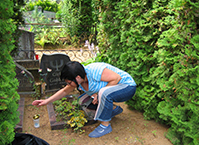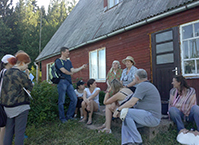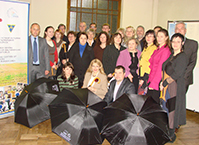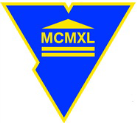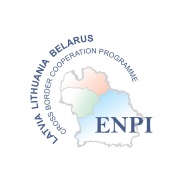Joint work. How did it go? What is the situation now?
Categories: Arvid Ratnieks
It was so. I’ll start from the end. A man once asked me: “What do you like most in joint work?” For me the best thing in the joint work is the moment when the hostess says: “Men, wash your hands and sit down to table!”
Joint work usually, at least as I remember it in the sixties – seventies, was connected either with potato planting or potato digging. There was also such a dung joint work, when dung was carted out. Well, I could tell you more about that. Usually, more people were necessary to cart out dung. There were at least some five, six, seven men. There usually were also, if one could get, two carts, two horses. so that while one cart of dung was taken away, the other was loaded.
Then there was one more interesting tradition. It was introduced by a young man from Krāslava. When the cattle-shed was cleansed, then a bottle of homemade vodka was dug in the very bottom in the shed, and the next year, when there was more than a metre of dung, then everybody knew that, remembered that from the previous year. And then, all the activities were aimed at being the first to clear that dung in that corner and get that bottle. The bottle was always emptied clean as well. Joint work was usually organized in autumn, and then, in most cases, a lamb was butchered. And, of course, all men who cleansed were treated to something stronger. We usually did like that: when five carts had been taken away, that was rather hard work, then we made a break. But when we had finished, then all the men were seated in the cart and taken to the yard. And then, the splashing each other with water began. Then it was a question of honour for every man to spill on possibly many women and the women tried to do the same. Water had been prepared beforehand and then it often turned out to be very funny. And it never ended in the first evening. On the second day, all the men, having done the chores, in the Sunday morning again appeared in the home, where they had worked the previous day, and continued to rejoice by the very evening of Sunday. But those, who felt even worse, those could come to the host even on Monday. If you participated in those events, which might now be called ‘cooperation’, then you had all autumn, all Saturdays busy, because, if you had invited six men, then you could be sure that next six Saturdays you would have to go to each of them and work together at their places. It was considered a matter of honour. If you missed going to somebody one year, another year, then the next, third year, nobody would come to help you out. That is cooperation.
This is, in fact, what they are trying to introduce with us here – the idea of cooperation – it still exists. Nowadays, such common work happens much more seldom, because the farms are bigger, farmers have machinery. That dung is cleansed using tractors, using equipment and so on. But those people, who still have one animal or less, those, maybe, organize such joint work events now, too.
Some time ago I marked on the shed wall, on the silicate bricks, I have the marks since the year seventy-one or so, I marked how many carts of dung were taken out that year – twenty, thirty or thirty-five and noted the date. Once, there was a mark made on the day of some party congress, it was written in honour of that congress. Simply, it was necessary to clear dung.
Video
Researcher: Dr. philol. Valentīns Lukaševičs, Daugavpils Universitāte


